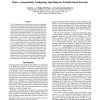Free Online Productivity Tools
i2Speak
i2Symbol
i2OCR
iTex2Img
iWeb2Print
iWeb2Shot
i2Type
iPdf2Split
iPdf2Merge
i2Bopomofo
i2Arabic
i2Style
i2Image
i2PDF
iLatex2Rtf
Sci2ools
108
click to vote
AAAI
2010
2010
Hydra: Automatically Configuring Algorithms for Portfolio-Based Selection
The AI community has achieved great success in designing high-performance algorithms for hard combinatorial problems, given both considerable domain knowledge and considerable effort by human experts. Two influential methods aim to automate this process: automated algorithm configuration and portfolio-based algorithm selection. The former has the advantage of requiring virtually no domain knowledge, but produces only a single solver; the latter exploits per-instance variation, but requires a set of relatively uncorrelated candidate solvers. Here, we introduce Hydra, a novel technique for combining these two methods, thereby realizing the benefits of both. Hydra automatically builds a set of solvers with complementary strengths by iteratively configuring new algorithms. It is primarily intended for use in problem domains for which an adequate set of candidate solvers does not already exist. Nevertheless, we tested Hydra on a widely studied domain, stochastic local search algorithms for...
Related Content
| Added | 29 Oct 2010 |
| Updated | 29 Oct 2010 |
| Type | Conference |
| Year | 2010 |
| Where | AAAI |
| Authors | Lin Xu, Holger Hoos, Kevin Leyton-Brown |
Comments (0)

